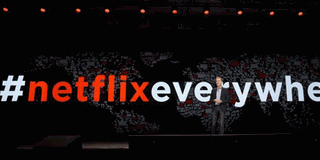How streaming of films threatens our national security

Netflix CEO Reed Hastings delivers a keynote address at CES 2016 at The Venetian Las Vegas on January 6, 2016 in Las Vegas, Nevada. Netflix provides movies on demand by sending customers email with a code that allows them to watch shows. PHOTO | AFP
What you need to know:
- Last year, the Communication Authority of Kenya found that the country had 31,985,048 Internet users or 69.6 per cent of the population — children included.
- The immediate effect of making so many breathless movies available in Kenya will distract people from waiting by their TV sets as the President polishes the occasional, live televised address after a terrorist attack.
- In fact, it is surprising that the Internet has been allowed to deliver all sorts of things that have not been checked for safety and morality.
Bad manners are as infectious as the common cold. That is why banning bad words, lewd songs, suggestive paintings, movies and programmes is the only way to keep bad influences at bay.
No government in its right mind can allow its citizens to be exposed to all manner of things in the name of entertainment.
Last year, the Communication Authority of Kenya found that the country had 31,985,048 Internet users or 69.6 per cent of the population — children included.
This is the door the American cultural imperialist organisation, Netflix, wants to use to corrupt the morals of Kenyans and radicalise the population.
Netflix provides movies on demand by sending customers email with a code that allows them to watch shows.
It streams programmes about drug lords, jailbreaks and same sex relationships.
These are shows routinely portray and glorify corruption, murder and underhand dealings that are hitherto unknown in Kenya.
The immediate effect of making so many breathless movies available in Kenya will distract people from waiting by their TV sets as the President polishes the occasional, live televised address after a terrorist attack.
TV, as we know it, will lose its power and hold over the people.
Hundreds of celebrities will be unemployed and village video show shops will close.
The exhibition stalls that burn pirated movies onto CDs will have to close, sending many more youth into penury.
Uninterrupted shows available on demand, are we trying to turn the whole country into one humongous eyeball of laziness.
OMINOUS FUTURE
Kenya is at risk of being turned into a zombie zone through binge-watching.
Members of the Kenya Film Classification Board might be forced into retirement for lack of work with Netflix refusing to be licensed.
If they want to use YouTube as an example for their impunity, even that can be shut down.
In fact, it is surprising that the Internet has been allowed to deliver all sorts of things that have not been checked for safety and morality.
China regulates its Internet, and see how prosperous and safe it is!
The timing of Netflix’s entry into Kenya is even more suspect coming as it does after the government has organised how it communicates and created a strong collaborative partnership with the media.
The newly created Government Advertising Agency which was just applying olive oil all over the media in preparation to perform a boy-to-body massage, might have work.
With Netflix delivering movies on demand, Kenyans could stop talking to each other altogether.
GSU officers, Administration and Kenya Police and even private security guards would be glued to their phones watching "Narcos", "Orange is the New Black" or, banish the thought, "House of Cards".
BE CAUTIOUS
Politicians, who are already quite sly without the aid of a manual, would be imitating Frank Underwood, giving every table they pass the traditional two knocks and leaving murder and evil in their wake.
Previous similar imperialist forays have been warded off by strong regulation and rules, such as the banning of reggae on radio airplay by President Daniel arap Moi.
Were it not for the foresight to ban bad music from Jamaica about the holy herb, Babylon and revolution, there is no telling if Kenya would have been spared the epidemic of coups d’etat every other country was going through in the 1980s.
Regulators in Kenya must not be hoodwinked by promises to provide parental controls and rating of content.





